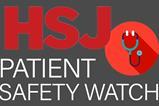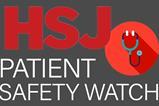HSJ hosts the Patient Safety Watch newsletter, written by Patient Safety Watch chief executive James Titcombe.
Good afternoon and welcome to the latest edition of the Patient Safety Watch newsletter.
We start this edition, yet again, with maternity safety – this time a Sky News report on an inquest which concluded last week for baby Finn. Finn died in 2021 following severe brain injury resulting from complications during labour after midwives failed to identify he was in foetal distress.
Coroner Julian Morris found a “lack of clear leadership” at the birthing centre, and “a failure to follow established guidelines in place”.
Finn’s father Martin told the broadcaster that among his biggest regrets was telling Finn’s mother, Ruth: “They are the professionals. We need to trust them.”
Meanwhile, legal firm Osbornes Law has reported on the settlement reached over the tragic death of baby Patryk Bielaszka following his birth in 2019.
The law firm reported “a failure in the antenatal period to diagnose vasa praevia, a condition in which foetal blood vessels cross or run near the internal opening of the uterus, and which means they are at risk of rupture when the supporting membranes rupture”.
Nicholas Leahy, associate in the clinical negligence team at Osbornes Law, said: “This is a truly tragic case that has understandably devastated the lives of my clients. Patryk’s parents were ignored by doctors, despite them having independent medical advice which showed [Patryk’s mother’s] pregnancy was at risk. Patryk’s death was completely avoidable, yet my clients feel that their poor English is being blamed for leading to what happened in this case.”
Two tragedies that, although different in circumstances, share only too familiar themes, including failing to listen to (and hear) women’s concerns. Finn’s father spoke of his regret of reassuring his wife to trust the professionals, but both Finn and Patryk’s parents had every right to believe their maternity care would be safe. They were badly let down.
In my view, it’s time we recognised these repeated tragedies are not one-off unfortunate events, but rather a consequence of a systemic problem at the very heart of our maternity system.
Before moving away from maternity safety, please read this powerful, informed and deeply moving piece by Hannah Barnes published in the Times last week. It’s a brilliant summary of what is going wrong and why urgent change is needed.
Patients need multiple GP appointments before cancer diagnosis
Research by The Nuffield Trust has found a fifth of people report they had to speak to GP staff three or more times before their cancer was diagnosed, rising to a third of people for those from Mixed, Asian and Black ethnicities and to nearly half for those aged between 16 and 24.
The think tank’s report highlighted how early diagnosis of cancer is linked with increased chances of survival, with the odds dropping sharply when the disease is diagnosed at stage four. The current aim is for 75 per cent of cancers to be diagnosed at an early stage by 2028, but The Nuffield Trust warned trends to date showed the NHS is “seriously off target”, with two in five cancers diagnosed at a late stage.
A quote in the report from Shine Cancer Support said: “Increasingly we are finding that patients tell us how hard it is to advocate for themselves, to follow up, to speak to anyone, to get things moving – I feel there’s a real sense that the system is broken and that it’s every person for themselves.”
Leak suggests thousands dying under care of community mental health teams
A report leaked to The Independent has suggested more than 15,000 people died in the year between March 2022 and March 2023 while under the care of community mental health teams. The figures include one unnamed mental health trust with more than 500 deaths during the year.
NHS Providers deputy chief executive Saffron Cordery told the newspaper: “The mounting pressure we’re seeing on community mental health services is unsustainable.”
Trust fined £200k over death of two patients
Tees, Esk and Wear Valleys Foundation Trust has been fined £200k after an earlier guilty plea to failing to provide safe care and treatment to two of its patients who died.
Seventeen-year-old Christie Harnett took her life at the former West Lane Hospital in Middlesbrough in June 2019, while an unnamed woman who was being treated at Roseberry Park Hospital, Middlesbrough, died of self-inflicted injuries in November 2020.
Ann Ford, Care Quality Commission director of operations in the north, said she hoped “this prosecution reminds health and social care organisations they must provide care in a safe way that meets the needs of people”.
TEWV chief Brent Kilmurray said: “We are deeply sorry for the events that led to these tragedies. We didn’t provide the care these two people deserved, and the guilty pleas reflect that.”
Half a million people in urgent need made their own way to hospital last year, figures reveal
Statistics obtained by the Liberal Democrats – and reported on by The Guardian – revealed 504,276 people in need of “very urgent emergency care” travelled to accident and emergency without an ambulance last year, up from 362,931 in 2019. The data also showed around a fifth of these people – 96,000 – were aged 65 or older.
Describing the findings as “shocking”, Royal College of Emergency Medicine president Adrian Boyle said: “It’s deeply concerning that people, especially older people, have lost faith in the system and are choosing to drive themselves or their loved ones to hospital out of desperation.”
He added: “The health risks are substantial and can result in delayed care for time-critical conditions, and there is a risk to driving while seriously ill. This well-meaning action could in fact have the unintended consequence of actually delaying access to care.”
MHRA publishes AI regulatory strategy
The Medicines and Healthcare products Regulatory Agency has published its strategic approach to artificial intelligence, covering five key principles to ensure patient safety and innovation through to 2030.
Sharing some good stuff…
AvMA launches new five-year strategy
You’ll likely know Action vs Medical Accidents as an independent charity which supports those adversely impacted by avoidable medical accidents and campaigns to improve patient safety and minimise future harm. This week it issued its new five-year strategy and is keen to hear feedback.
AvMA is particularly interested in hearing about ways you could help support its work and deliver its strategy, especially any specific projects it has identified as priorities. More information and how to provide feedback is available here.
As someone who has personally been helped by AvMA at a very difficult time, I know the huge value of the work they do and the difference it makes.
Sands and Tommy’s Joint Policy Unit call for evidence
The Sands and Tommy’s Joint Policy Unit has launched an important call for evidence to help identify “what is needed to make progress on key themes from previous reports and reviews into the safety of maternity and neonatal services”, “the key policy changes needed to make progress”, and what changes may help deliver safer maternity and neonatal care in the areas identified by their work.
Martha’s Rule is here!
This newsletter regularly covers developments with Martha’s rule – a hugely important initiative and milestone for patient safety. As many trusts are moving towards implementation, a brilliant summary of how Martha’s Rule should work (from Bradford Teaching Hospitals) was shared on X by Martha’s mum Merope.
Patients as Partners
Patient safety commissioner Henrietta Hughes has written an excellent blog summarising key messages from the Global Ministerial Summit in Chile last month. The blog includes (one of my patient safety hero’s and a founder of the patient safety movement in England and internationally) Sir Liam Donaldson’s call for action, which includes building ”solidarity with victims of harm”. In a system that too often compounds the harm of those affected by patient safety incidents, this is an area I truly hope all can prioritise.
SEIPS Masterclass – Places Available!
The Patient Safety Incident Response Framework promotes a range of system-based approaches for learning from patient safety incidents, including Systems Engineering Initiative for Patient Safety. The Clinical Human Factors Group is running an online training course, delivered by the brilliant Dawn Benson, providing an introduction to SEIPs and how to apply it on 17 May, with places still available to book.
Countdown to Congress!
We are another two weeks closer to the HSJ Patient Safety Congress (16 and 17 September in Manchester) and the programme is looking better than ever. As you would expect, this year maternity safety features prominently, with sessions covering key areas such as:
- Learning from maternity investigations and tools to improve and deliver safety;
- Learning from Nottingham and delivering maternity improvement across providers;
- A human factor training strategy to embed a systems-based approach: sustainably empowering frontline maternity staff to improve safety;
- Having a voice and being heard: highlighting the long-term impacts of birth trauma and risks around health inequalities in maternity; and
- Unpicking key outcomes of the cross-party birth trauma inquiry and next steps.
The latest version of the congress programme and details of how to enrol are available here. I hope to see many of you there!
Before signing off, some brief personal reflections. Having worked in the patient safety space for some years, I must admit sometimes it feels like an uphill struggle with more reasons to be pessimistic than optimistic. However, conversations with friends and colleagues this week have reminded me just how many good people are working towards positive change and that safe, kind and compassionate healthcare is delivered day in, day out, mostly unnoticed.
When things do go wrong, however, the consequences can be profound and tragic. Parents and families often express their guilt and regret for “trusting the professionals” – yet they had every right to do so. In the past, patient safety has rightly focused on efforts to prevent future harm, but as Sir Liam Donaldson says, in the future, it must also encompass restoring broken trust and building solidarity with those who have been harmed – a vital part of the solution.
That’s all for this edition. Please look out for our next edition in two weeks. In the meantime, thanks for reading, enjoy the bank holiday weekend and stay safe.
James Titcombe
































No comments yet